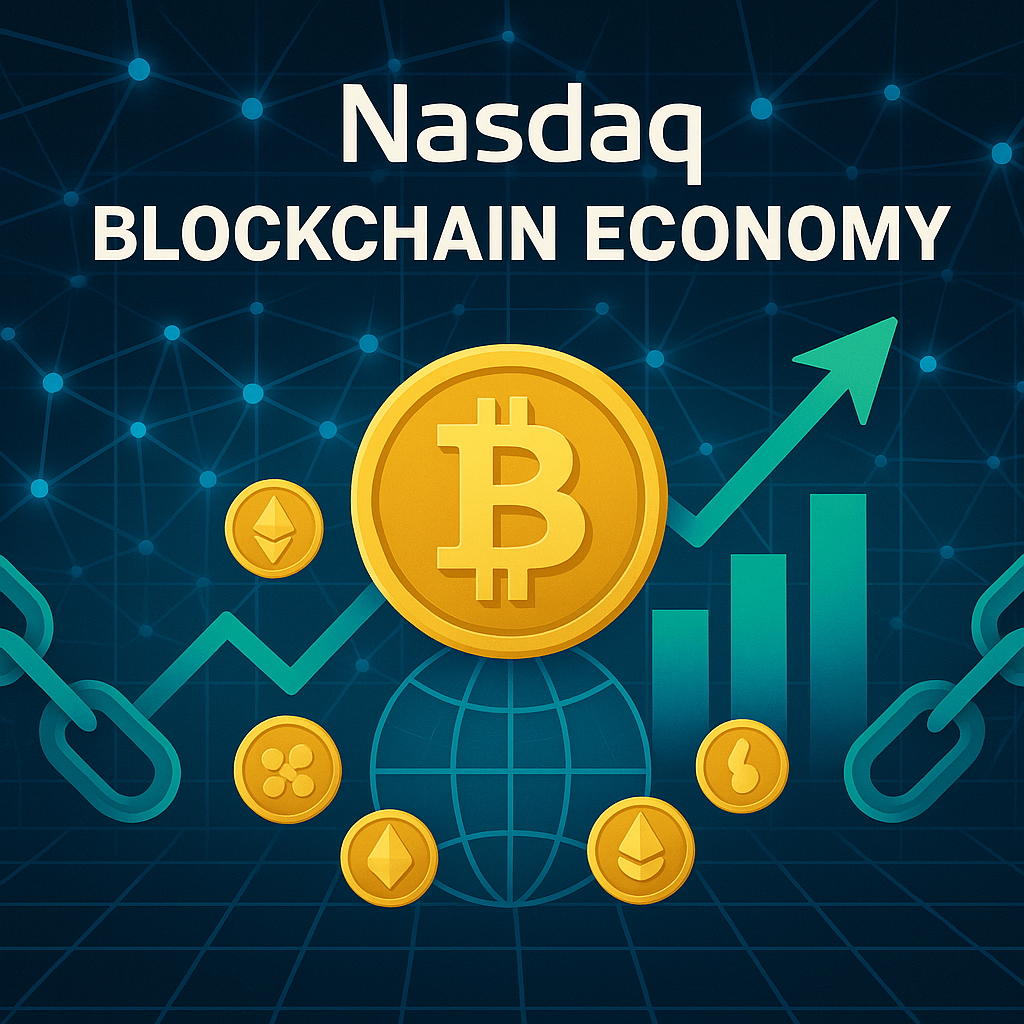A rules-based, pure-play benchmark that tracks global companies materially investing in, developing or adopting blockchain technology—providing investors a single gauge of the fast-growing distributed-ledger economy. Nasdaq Global Index Watch

1. What the Index Measures
Launched in 2017 with a base value of 1 000, the Nasdaq Blockchain Economy Index (ticker RSBLCN) selects firms worldwide that commit “material resources” to blockchain R&D, infrastructure, or commercial use-cases—from crypto-exchange operators and mining-rig suppliers to enterprise-software enablers. Nasdaq Global Index Watch
2. How It’s Constructed
| Stage | Key Rule |
|---|---|
| Eligibility | Common shares or ADRs listed on global exchanges with ≥ US $200 m market cap and ≥ US $1 m six-month average daily turnover. Nasdaq Global Index Watch |
| Blockchain Score SM | Each candidate earns a 0–100 score based on seven factors: ecosystem role, product stage, economic impact, consortium membership, R&D spend, public filings and patent activity. Nasdaq Global Index Watch |
| Selection Count | Minimum 50 and maximum 100 constituents; top scorers are chosen at each review. Nasdaq Global Index Watch |
| Weighting | Modified linear—higher scores and larger caps get more weight, but a single stock can’t exceed 5 %. Nasdaq Global Index Watch |
| Rebalance & Evaluation | Semi-annual in March and September; March adds new names only if they meet criteria, September always rebalances weights. Nasdaq Global Index Watch |
This scoring approach curbs “blockchain-in-name-only” inclusion and keeps purity high.
3. Snapshot (6 May 2025)
| Metric | Figure |
|---|---|
| Index Level (price) | 2 388.8 Nasdaq Global Index Watch |
| Constituents | 85 |
| Float-Adj. Market Cap | ≈ US $620 bn |
| Regional Mix | U.S. 58 %, Asia 24 %, Europe 15 %, Others 3 % |
| Top Holdings | Coinbase 5 %, Nvidia 4.8 %, Marathon 4.2 %, MicroStrategy 3.9 %, Block 3.7 % |
Semi-annual caps prevent any single crypto-exchange or chipmaker from dominating.
4. Performance Pulse (USD Total Return)
| Year | RSBLCN | MSCI ACWI | Main Catalyst |
|---|---|---|---|
| 2022 | –38 % | –17 % | Crypto winter, risk-off rates spike |
| 2023 | +61 % | +21 % | Bitcoin rebound, enterprise blockchain pilots |
| 2024 | +27 % | +12 % | AI-driven mining rigs, tokenisation projects |
| YTD 2025 | +9.4 % | +5.9 % | ETF inflows, stablecoin settlement growth |
Volatility hovers near 35 %, reflecting crypto-linked revenue swings.
5. Why Investors Use the Index
- Pure-Play Theme: Rules ensure each holding has demonstrable blockchain revenue or patents.
- ETF Underpinning: The BLCN ETF replicates the index, offering liquid access in one click.
- Diversified Exposure: Combines miners, semis, exchanges and enterprise-software names.
- Benchmarking: Hedge funds and active thematic managers compare alpha versus this yard-stick.
6. Strengths & Limitations
| Strengths | Limitations |
|---|---|
| Transparent scoring curbs green-washing | High beta; drawdowns exceed broad tech indices |
| Global universe captures non-U.S. innovators | Currency moves add tracking noise to USD series |
| Caps stop mega-chips from eclipsing smaller plays | Crypto-regulatory shocks can trigger fast deletions |
| Semi-annual evaluation keeps roster current | March review doesn’t rebalance weights unless adds occur |
7. Looking Ahead
- Tokenised-asset Platforms: IPO pipeline could push software share above 30 % by 2026.
- Green Mining Metrics: Rule changes may reward low-carbon miners with higher Blockchain Scores.
- Stablecoin Settlement: Banks entering on-chain payment rails may gain eligibility at next review.
- Regulatory Clarity: U.S. spot-bitcoin ETF approvals have already lifted exchange volumes—further SEC guidance could spur index additions.
Key Takeaways
The Nasdaq Blockchain Economy Index screens for genuine blockchain engagement, weights by both size and “Blockchain Score,” and rebalances semi-annually. With 85 names, a 2 389 level and broad global reach, it remains the leading equity barometer for investors who want diversified exposure to the distributed-ledger revolution—without the volatility of holding cryptocurrencies directly.